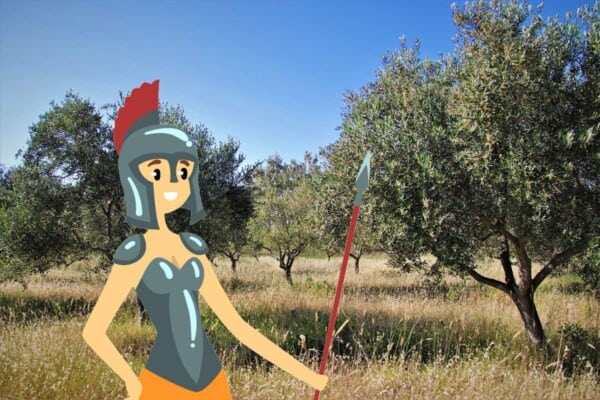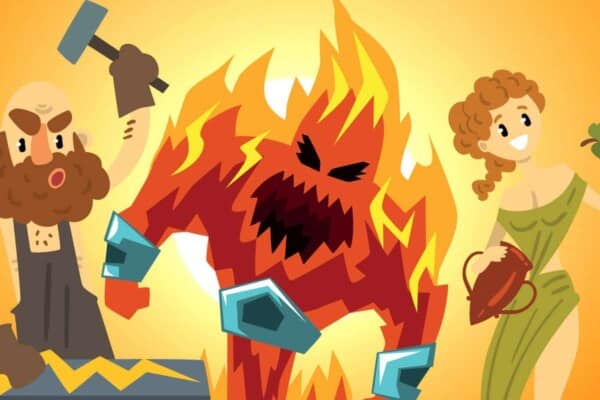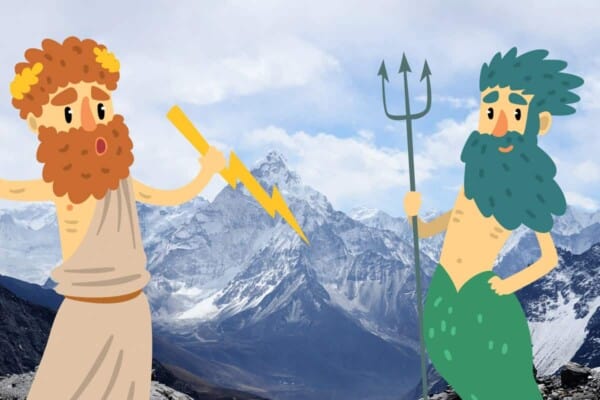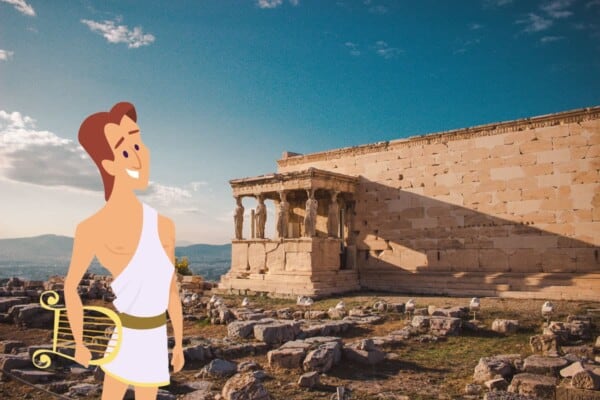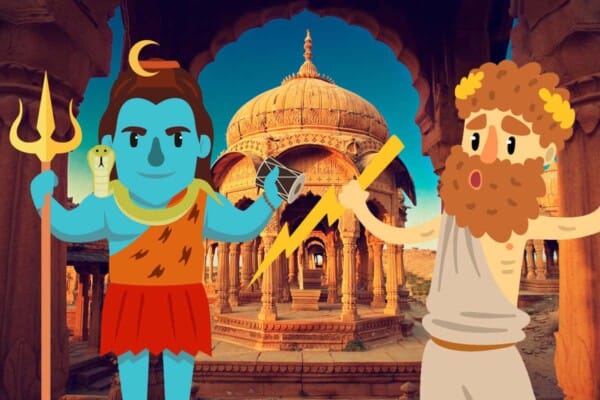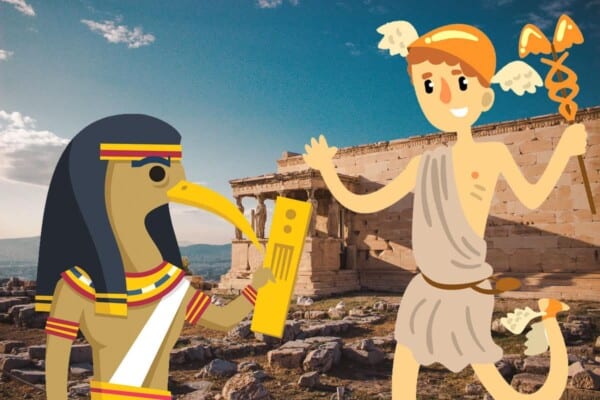There were fourteen members of the second and greatest race of Greek gods, but only twelve are generally considered Olympians – so was Hades one of them?
Although Hades was brother to the first gods and the oldest of Cronus’s children, he was named King of the Underworld and God of the Dead after the Titans’ defeat. His realm was the Underworld, and he did not reside on Mount Olympus. For this reason, he is mostly not considered an Olympian.
Who are the Olympians?
The following table tells a bit more about the fourteen gods and goddesses born of the Titans or of the next generation and what they do. It also mentions their parents and their Roman equivalent names.
| God/Goddess | Title | Parent(s) | Residence and Seat |
| Zeus (Jupiter) | King of the Gods, God of the Sky and Lightning | Cronos, Rhea | Olympus, Olympian |
| Hera (Juno) | Queen of the Gods, Goddess of Marriage and Family | Cronos, Rhea | Olympus, Olympian |
| Hestia (Vesta) | Goddess of the Hearth and of Domesticity | Cronos, Rhea | Olympus, Olympian |
| Hades (Pluto) | King of the Underworld, God of the Dead | Cronos, Rhea | The Underworld, Chthonic God |
| Poseidon (Neptune) | God of the Sea, Storms, and Horses | Cronos, Rhea | Olympus, Olympian |
| Demeter (Ceres) | Goddess of the Seasons and the Harvest | Cronos, Rhea | Olympus, Olympian |
| Athena (Minerva) | Goddess of Wisdom and Warfare | Zeus, Metis | Olympus, Olympian |
| Apollo | God of Archery, the Sun, and Music Twin brother of Artemis | Zeus, Leto | Olympus, Olympian |
| Artemis (Diana) | Goddess of the Hunt and the Moon, Twin sister of Apollo | Zeus, Leto | Olympus, Olympian |
| Ares (Mars) | God of War and Bloodshed | Zeus, Hera | Olympus, Olympian |
| Aphrodite (Venus) | Goddess of Beauty, Love, and Desire, Wife of Hephaestus | Zeus and Dione or Uranus’s genitals and the sea | Olympus, Olympian |
| Hephaestus (Vulcan) | Master Blacksmith, God of Fire and Craftmanship, Husband of Aphrodite | Hera, Zeus (depending on the myth) | Olympus, Olympian |
| Hermes (Mercury) | Messenger of the Gods, God of Travel, Thieves, and Games, Psychopomp | Zeus, Maia | Olympus, Olympian |
| Dionysus (Bacchus) | Patron God of Theatre, God of wine, fertility, ecstasy, and madness, The only half-mortal Olympian | Zeus | Olympus, Olympian |
As you can see, the table shows a whole (complicated!) family of gods, eleven of whom are always referred to as the Olympians, and one of whom is never. Although Hades was one of the original gods and sons of Cronos, he was excluded from Olympus by virtue of his rule of the Underworld. His sister, Hestia, is usually said to have given up her seat of power in favour of their nephew, Dionysus.
Hades is separate from them as he is a chthonic or subterranean god who does not live upon Olympus at all. Though he matches his brother in power, he is very much separate from the rest. Only Hermes crosses the barrier between them regularly.
What is Hades’ Relationship to the Olympian Gods?
The Titans, the Greek gods, and several demigods, nymphs, and mortals all come together to form one big messy family. Hades’s most significant relationships with the Twelve Olympians (and Hestia) are as follows.
- Zeus – The youngest brother of Hades. They are usually portrayed as having somewhat of a rivalry. Each views their work (Zeus in the heavens and Hades in the Underworld) as more important.
- Poseidon – The second youngest brother of Hades. Poseidon’s relationship with Hades is rocky as Hades resents his brothers for winning the sea and sky. However, it is generally portrayed as less of a rivalry than his relationship with Zeus.
- Hera – One of Hades’s older sisters. She is the wife of Zeus and consequently queen of the gods, and her relationship with Hades is usually cordial at best.
- Hestia – The oldest sister of Hades, Hestia, is the only other who is not an Olympian since giving up her seat for Dionysus. She is a goddess of life while he is the god of death.
- Demeter – The last of Hades’s older sisters. They have a very tumultuous relationship, especially as Hades later abducts and marries her daughter, Persephone.
- Athena – Hades’s niece and Zeus’s favorite daughter. She and Hades have a business relationship, and Athena once helped Heracles escape the Underworld.
- Apollo – Hades’s nephew by Zeus. As god of the sun, he does not have much to do with the Underworld’s subterranean god.
- Artemis – Hades’s niece by Zeus. She abhors men with very few exceptions and has no cause to interact with Hades.
- Ares – Hades’s nephew by both Hera and Zeus, Ares is least beloved god by other Olympians. However, Hades has a closer relationship with him as Ares’s love of death has helped expand the Underworld.
- Aphrodite – Either Hades’s niece by Zeus or his aunt by the castrated genitals of Uranus. Aphrodite and Hades had little to connect them. Still, Hades’s wife Persephone competed with Aphrodite over the same mortal man, Adonis.
- Hephaestus – Hades’s nephew either by Hera alone or Hera and Zeus. Hades and Hephaestus do not have much cause to interact, but both are rejected by several Olympians.
- Hermes – Hades’s nephew by Zeus. Hermes is the closest Olympian to Hades and operates as a psychopomp who escorts souls to the Underworld.
- Dionysus – Hades’s nephew by Zeus. He is linked by his half-mortal blood and by Orphic tradition to the figure of Zagreus, who is either Hades’s son by Persephone or an epithet of Hades himself. According to some, Dionysus’s rule over life makes him the other side of the coin to Hades, conflating them into two sides of the same god. Homer also has Dionysus descend into the Underworld to rescue his mortal mother and return her to Olympus.
Is There a Difference Between God of Death and God of the Dead?
Though Hades is God of the Dead, responsible for judging souls and caring for them in the afterlife, the God of Death is actually Thanatos. Thanatos is the son of the primordial gods of night and darkness, Nyx and Erebus, and the twin brother of Hypnos, God of sleep.
Though Thanatos is a minor figure in mythology, he is an important servant of Hades. His job is to capture souls who do not travel across the River Styx to bring them back to the House of Hades for judgment. He is somewhat reminiscent of the Grim Reaper in western thought.
Final Thoughts
Hades is not an Olympian, but he is undoubtedly a key figure in Greek mythology. As one of the three brothers who overtook their forebears, the Titans, and ruler of one of the three realms of being, Hades serves a special role. He is both feared and revered, one of the family and yet separate from them. His complicated relationship with the Olympians reflects his role as the god of death and the complex relationship humans have with conceptualizing the afterlife.
To conflate Hades with hellish figures such as Satan is to do both a disservice. Hades is not evil. He serves an essential role below the ground as Zeus and Poseidon and the others above it. He is not an evil lover of destruction, but rather he shoulders the responsibility of an entire third of the world – even as it excludes him from his own family.
By most accounts, Hades was not happy to draw the lot that left him in charge of the Underworld, and yet he served more diligently than either brother – perhaps as a sign that death is inevitable.



